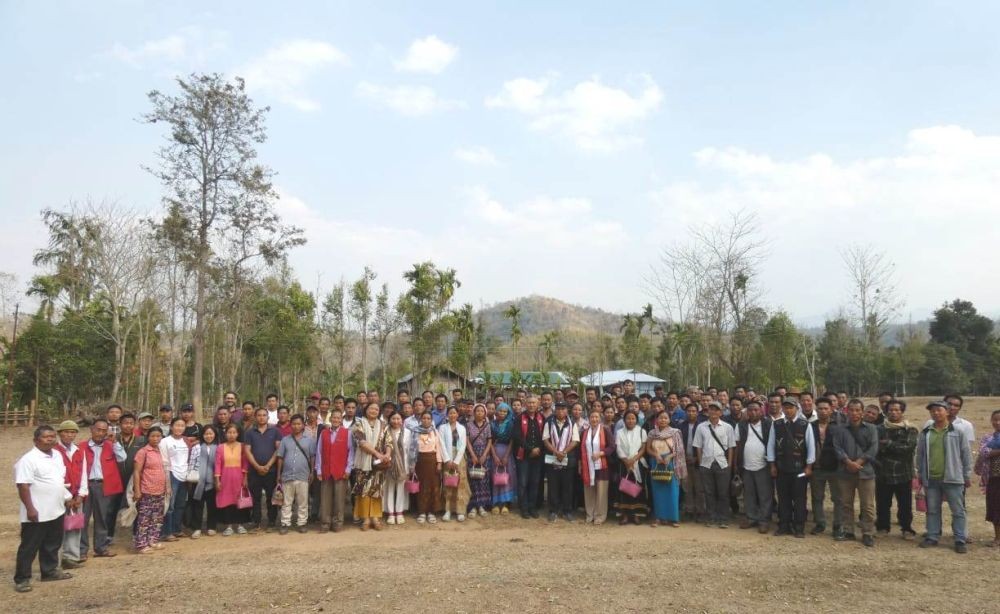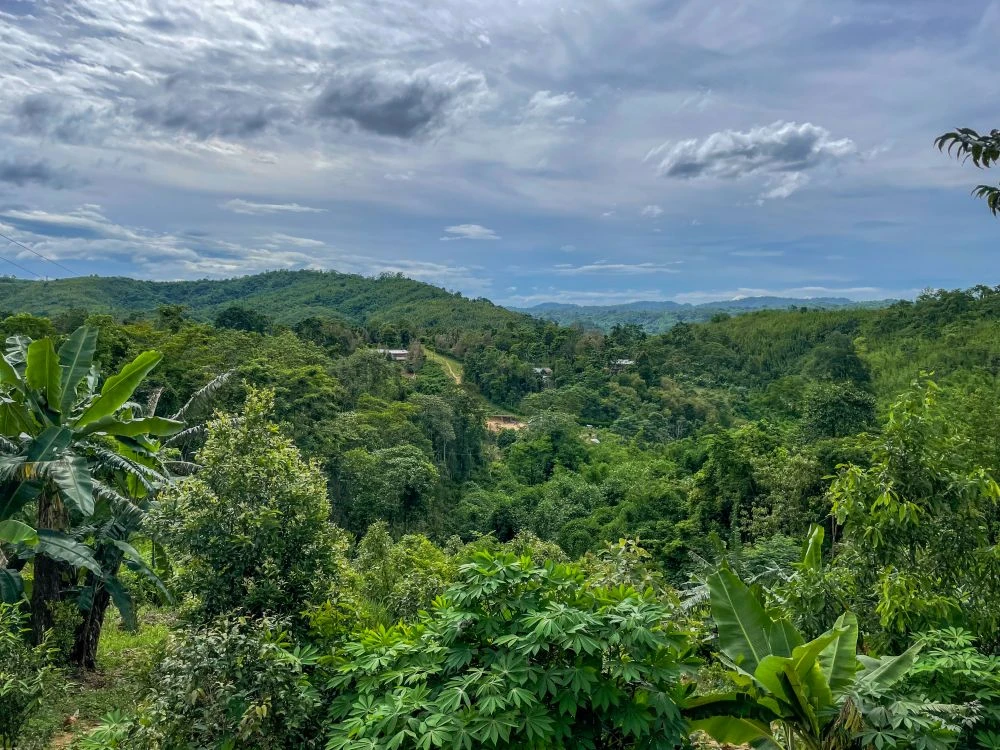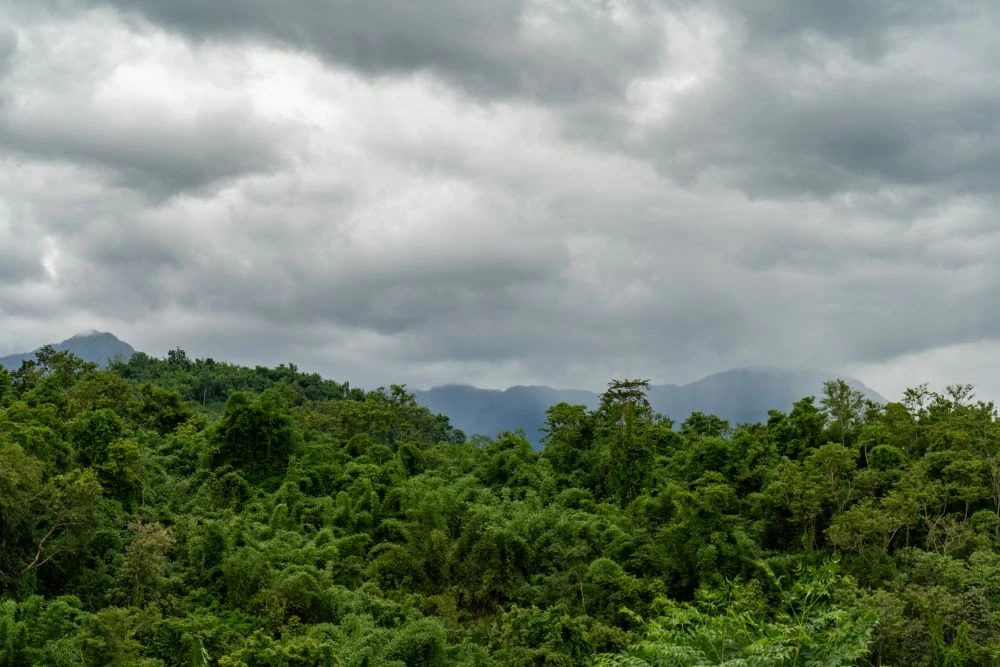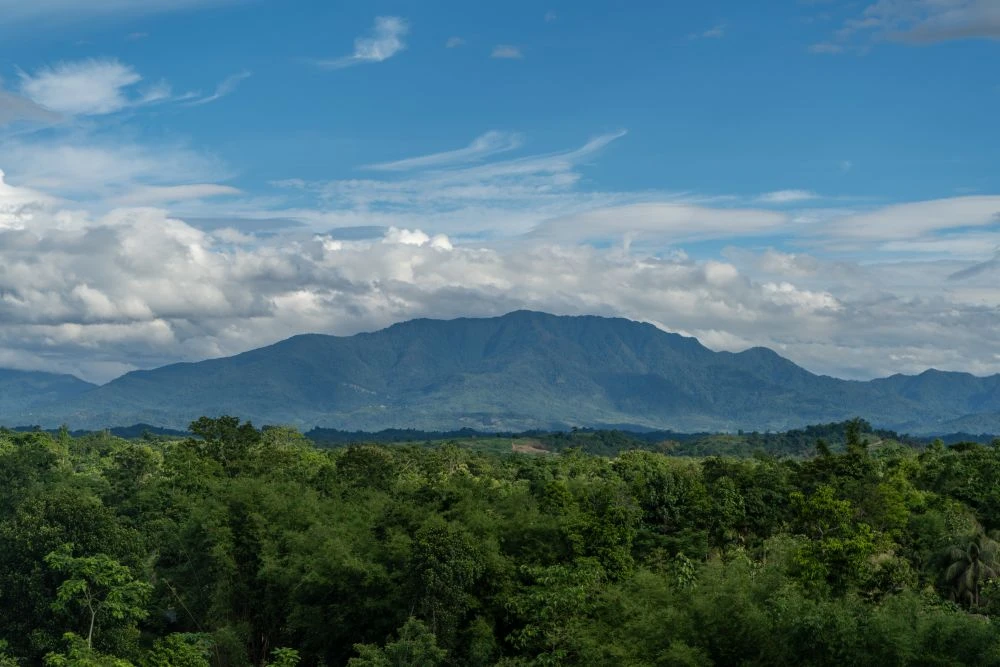Field Director Ntangki National Park, President, Kuki Inpi, office bearers of Zeliang Kuki Public Organisation, village council representatives of 26 villages during their meeting at Ikiesingram village, Athibung circle on March 8. The meeting was facilitated by WCS-India and organised by Athibung Sub-Division Zeliang Kuki Public Organisation. (Photo Courtesy: Sourav Dutta, WCS-India)

Local communities seek collaborative efforts to combat illegal activities for protection of State’s only national park
Morung Express News
Ikiesingram | March 9
In a significant step towards safeguarding Ntangki National Park (NNP) Peren, long plagued by rampant hunting and logging resulting, a community of fringe villages came together on March 8 to address the widespread exploitation and destruction of the protected forest.
The first of its kind meeting was organised by the Athibung Divisional Zeliang Kuki Public Organization (ZKPO) and facilitated by the Wildlife Conservation Society-India (WCS-India) at Ikiesingram village.
Approximately 120 participants, including 26 village representatives and 10 women leaders, attended the gathering, which aimed to foster collaboration between local communities and authorities to devise an urgent, coordinated response for preserving the lone national park in Nagaland.
Among the attendees were T Aochuba, NNP Field Director; Kuki Inpi President L Singsit and representatives from the ZKPO.
The ZKPO presented a memorandum to the Director NNP urging the recruitment of at least 20 “guardians” to assist the Forest Department in protecting the park.

Despite efforts by the Nagaland government, the park's protection has largely been ineffective due to the absence of local guardians from surrounding villages, it highlighted, asserting that these guardians could serve as crucial links between the community, the park’s biodiversity, and traditional culture.
The ZKPO further underscored that involving local villagers in conservation efforts would not only enhance protection but also strengthen the bond between biodiversity preservation and the people.
The guardians would play a vital role in safeguarding the park when government personnel are off-duty, it maintained.
In his address, NNP Field Director, Aochuba acknowledged the need for greater community engagement and assured to discuss the matter with his department.
He also highlighted the potential for eco-tourism in the Ntangki landscape, noting that such initiatives could provide opportunities for local youth and employment.
The Field Director also acknowledged that both the Forest Department and local communities had fallen short in their efforts to protect the park, and that the fringe communities had not been effectively engaged in its conservation.
Likewise, he noted that neighbouring villages have allowed hunters and illegal loggers into the NNP in exchange for monetary gains, leading to a continued decline of the park.
Challenges in establishing ESZ
Aochuba also discussed the ongoing challenge in establishing an Eco-Sensitive Zone (ESZ) around the park.
According to a Supreme Court ruling, a minimum one-kilometer buffer zone should surround protected forests, national parks, and wildlife sanctuaries.
However, he explained that the State Government had been unable to finalise the ESZ due to resistance from some fringe villages unwilling to provide land for the buffer zone.
Hence, the Field Director appealed to those villages to reconsider their stance, emphasising the long-term benefits of the zone.
Despite the challenges, he assured his commitment to working with the Kuki Inpi and the ZKPO to resolve the issues surrounding the ESZ.

‘Ntangki has become a firing range’
Meanwhile, Rangnim Pame, Head GB of Ikiesingram, described the exploitation of Ntangki Forest as alarming, especially during the hunting seasons in October and November and likened the forest to a firing range, with gunshots echoing nonstop throughout the hunting period.
He also maintained that the call for local guardians was not driven by the desire for jobs or benefits but by the increasing need for protection due to the lack of effective government action.
Despite the presence of Forest Guards, illegal activities continue to threaten the park, he held.
“We have a lot of workforce, but it has not shown any success,” Pame stated, expressing frustration over the state government’s failure to address the exploitation of Ntangki, including illegal hunting, logging and other destructive activities.
He further viewed that recruiting guardians from the neighboring villages could improve coordination and enforcement, addressing not only external offenders but also individuals from the local villages who facilitate or engage in illegal activities such as wildlife hunting and trade.
“We need a different set of laws,” he added, underscoring the urgency for a more effective approach to safeguard the forest.
Community involvement essential
Kuki Inpi President Singsit stressed the need for the surrounding villages to be more involved in conservation efforts, particularly due to the increasing environmental challenges in the Athibung area.
He pointed out that climate change and the degradation of the forest have already caused significant water scarcity issues.
"We should not be part of the problem but part of the solution," Singsit noted, further calling on churches to actively engage in discussions around conservation and biodiversity.
Beisumpiukam Village Council Chairman Tadi added that the NNP belongs to everyone, and all the Naga tribes should take responsibility for its protection.
He called on the State Government to involve local landowners and communities in conservation initiatives.

Defining Guardians’s role
The decision of the community to form‘conservation collective’ is in the right direction considering the threatened state of forests and environment at Ntangki, observed Bano Haralu, Project Lead of WCS-I Integrated Tiger Habitat Conservation Programme/International Union for the Conservation of Nature(ITHCP/IUCN) Phase-II.
She, however, pointed out that if a community agreement is made, the villagers must clearly understand what they are committing to, along with the associated responsibilities.
Unless the role of the community and the Forest department are clearly defined, it would not be effective, she maintained.
Haralu also stated that the "Guardian of Ntangki," or whatever the final nomenclature may be, cannot simply be another tick mark for employment generation, adding: “We no longer have the luxury of time to be idle with the management and conservation of our natural resources and biodiversity.”
She noted that these ‘guardians’ would require intense capacity building training in conservation education and to conduct biodiversity surveys.
Haralu also stated that the Forest Department must work out the modalities on the responsibilities and authority of the guardians to effectively assist in protecting the park, especially in complex situations while on duty.
A robust line of communication between the guardians and the Forest Department is crucial for effective collaboration, she added.
Besides, with village councils on the fringes of NNP having their own regulations and norms regarding biodiversity, Haralu said these ‘guardians’ should not become a scapegoat in the failure of the VCs to implement and monitor their own regulations.






